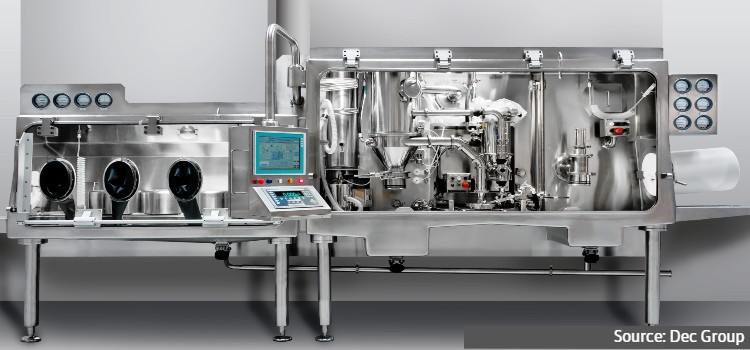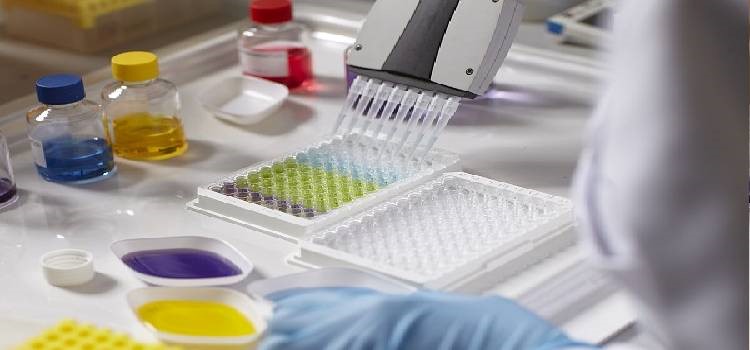Future Trends in Pharmaceutical Isolators: Enhancing Safety and Efficiency
17-Sep-2024

Introduction
Pharmaceutical Isolators, frequently referred to as containment units, stand as indispensable assets within the pharmaceutical industry. Their significance is multifaceted, as they assume a pivotal role in guaranteeing the quality of products, safeguarding the well-being of operators, and preserving the environment. In a constantly evolving technological landscape, the trends in pharmaceutical isolators march forward in tandem. In this comprehensive guide, we embark on a journey to unveil the forthcoming trends in these essential devices.
Automation and Robotics
The pharmaceutical industry is on the brink of a substantial change with the introduction of automation and robotics in pharmaceutical isolators. The incorporation of robotic and automated systems represents a groundbreaking development that is set to revolutionize the way these machines operate. These systems are set to reduce the need for human involvement in critical processes dramatically.
This not only lowers the risk of contamination but also minimizes the potential for operators to be exposed to dangerous substances. Their unmatched precision and consistent performance raise the bar for quality control in pharmaceutical production, promising to elevate industry standards to unprecedented levels. In essence, this technological shift is poised to usher in a new era of efficiency and safety in pharmaceutical manufacturing.
Numerous companies within the pharmaceutical sector are increasingly turning to automation and robotics to minimize contamination and enhance precision in drug development. Among these forward-thinking companies is Metall+Plastic, a prominent player in the pharmaceutical industry.
The company introduced a state-of-the-art isolator system designed to establish a safe and more secure setting for pharmaceutical manufacturing. This innovation marks a significant leap forward in ensuring the quality and safety of pharmaceutical manufacturing processes, aligning with the industry's growing trend toward advanced technological solutions for improved pharmaceutical manufacturing practices.
Advanced Materials
The future of pharmaceutical isolators is closely tied to the progress and integration of cutting-edge materials. Traditionally, isolators in the pharmaceutical industry were primarily made from stainless steel. However, modern materials such as high-performance polymers are becoming increasingly popular.
These newer materials offer numerous advantages, including reduced weight, improved ergonomic design, and enhanced resistance to chemical corrosion. As the pharmaceutical sector advances, it is anticipated that isolators crafted from these advanced materials will play a more prominent role in the industry. This, in turn, reflects the ongoing evolution of pharmaceutical manufacturing practices.
Single-Use Isolators
An emerging trend in the pharmaceutical industry is the increasing adoption of single-use isolators. Traditional isolators necessitate extensive cleaning and decontamination after each use, which can be time-consuming and expensive. Single-use isolators provide an innovative solution to this challenge by offering a disposable and pre-sterilized alternative. This not only reduces the risk of cross-contamination but also streamlines operational processes, making it a cost-effective and efficient choice for pharmaceutical manufacturing.
ILC Dover, a renowned leader in containment and flexible isolation technologies, made a significant advancement in the isolator market with the introduction of their cutting-edge flexible aseptic isolator. Designed to cater to the stringent needs of the pharmaceutical and biopharmaceutical sectors, this innovative solution offers a unique advantage as a single-use chamber.
The isolator provides an extra layer of assurance for preventing cross-contamination and ensuring product integrity. Its adaptability combined with the convenience of being a single-use system makes it an ideal choice for industries that demand high levels of sterility and compliance while optimizing their operational processes.
Adaptive Designs
The pharmaceutical industry is currently witnessing a notable shift toward embracing more flexible and adaptive designs than before for isolators. The need for enhanced responsiveness and versatility drives the shift toward flexible and adaptive isolator designs in the pharmaceutical sector.
These adaptable isolators can easily cater to the evolving demands of pharmaceutical manufacturing, allowing rapid changes to accommodate diverse processes and product variations. This not only improves operational efficiency but also reduces downtime and the costs associated with retooling fixed systems. As a result, the pharmaceutical industry invests in research and development activities to create more innovative and customizable isolator solutions tailored to meet the unique needs of different production lines and facilities.
Several companies are making substantial advancements in the pharmaceutical and biotechnology industries. One of the companies riding on this wave is Tema Sinergie. It launched the latest range of isolators dedicated to Advanced Cellular Therapies and Regenerative Medicine (ATMP). Derived from the CC-IS isolator series, these cutting-edge isolator design provides a secure and contamination-free environment superior to conventional biosafety cabinets, clean booths, and standard white rooms.
This isolator has remarkable flexibility and fluidity, accommodating the dynamic needs of research and development in the ATMP field. This emphasis on ergonomic design ensures operators can perform effectively while maintaining the utmost safety and sterility standards. Tema Sinergie's innovative isolators are poised to revolutionize the landscape of ATMPs, emphasizing safety, compliance, and operator satisfaction. This will play a crucial role in advancing cutting-edge medical treatments.
Energy Efficiency
Sustainability is emerging as a paramount concern within the pharmaceutical industry, reflecting a broader global shift toward environmental consciousness by adopting energy-efficient technologies, such as LED lighting, low-energy HVAC (heating, ventilation, and air-conditioning) systems, and improved insulation. These technologies enable energy savings by reducing electricity consumption and lowering greenhouse gas emissions.
As these sustainability trends continue to gain momentum, the pharmaceutical industry is poised to make a substantial positive impact on the environment and inspire other sectors to follow suit. This will forge a path toward a more sustainable and responsible future.
Numerous companies operating in the pharmaceutical industries are proactively implementing energy-saving strategies and creating advanced energy-saving technologies to lower greenhouse gas emissions and encourage environmental sustainability. One of the companies is PHC Corporation, a Japan-based life sciences and healthcare IT company. It launched the VIP ECO SMART ultra-low temperature freezer series, setting a new benchmark for energy efficiency.
With nearly 30% reduction in power consumption compared to previous models, this series of HFC-free ultra-low temperature freezers is an eco-conscious and cost-effective solution. These freezers, available in various models and voltages, offer secure storage for specimens and samples, catering to the needs of research, drug discovery, and life sciences sectors. This innovation not only aligns with sustainability goals but also highlights the pivotal role in enhancing energy effectiveness in the pharmaceutical and life sciences sectors. It will ensure a greener and more economical path forward.
Integration with the Industry 4.0
In the coming years, pharmaceutical isolators are expected to integrate with the Industry 4.0 technologies. This includes using the Internet of Things (IoT) sensors for real-time data monitoring, predictive maintenance, and remote operation. These IoT sensors offer real-time monitoring of critical environmental variables, including temperature, humidity, air pressure, and containment levels, reaching a level of detail and immediacy previously unattainable.
This paradigm shift includes predictive maintenance, a strategic leap that harnesses data analysis to pre-emptively address equipment issues, minimizing costly and productivity-disrupting downtime. A significant transformation comes from remote operation capabilities, granting unparalleled operational flexibility in a globalized pharmaceutical landscape. This new age of pharmaceutical manufacturing is marked by remarkable precision, operational efficiency, and an unwavering commitment to quality and safety standards.
Conclusion
In conclusion, the evolution of pharmaceutical isolators stands as a testament to the industry's commitment to excellence in quality assurance, operator safety, and environmental responsibility. The introduction of automation and robotics brings a new era of precision and safety, reducing the risk of contamination. The adoption of advanced materials such as high-performance polymers offers lightweight and corrosion-resistant alternatives.
Single-use isolators are streamlining production while ensuring contamination prevention. The shift towards more versatile and adaptive isolator designs optimizes efficiency and reduces downtime. The growing focus on sustainability, marked by eco-friendly solutions from various companies, emphasizes the industry's dedication to environmentally responsible practices.
Lastly, the integration of Industry 4.0 technologies, featuring IoT sensors, predictive maintenance, and remote operation, signifies a future of heightened precision and efficiency in pharmaceutical manufacturing. Together, these trends pave the way for a promising and dynamic future for pharmaceutical isolators, advancing the industry and its contributions to a sustainable and technologically advanced world.
About the Author
 Arjun Chetry is an accomplished researcher and writer with a rich history of more than three years in conducting thorough research. With a professional background as a market researcher, he has a keen eye for analyzing industry trends and understanding consumer behavior. His dedication to exploring diverse subjects and conducting in-depth analyses has equipped him with a deep understanding of research intricacies. He remains committed to staying up-to-date with the latest market trends and recognizing their impact on both business and society. His well-rounded interests and experiences contribute to his ability to offer insights and perspectives on a wide range of topics. The author can be reached at info@nextmsc.com
Arjun Chetry is an accomplished researcher and writer with a rich history of more than three years in conducting thorough research. With a professional background as a market researcher, he has a keen eye for analyzing industry trends and understanding consumer behavior. His dedication to exploring diverse subjects and conducting in-depth analyses has equipped him with a deep understanding of research intricacies. He remains committed to staying up-to-date with the latest market trends and recognizing their impact on both business and society. His well-rounded interests and experiences contribute to his ability to offer insights and perspectives on a wide range of topics. The author can be reached at info@nextmsc.com
Add Comment
Related Blogs
The Future of Immunoassays in Latin America: Trends and Predictions
According to the latest report published by the Next Move St...
Early Toxicity Testing: Essential Essence of Drug Development
Introduction New drug development is a complex and highly regulated process t...
Acquisitions and Approvals: Current Trends in the Analgesics Industry
Introduction The Analgesics Industry is one of the import...










